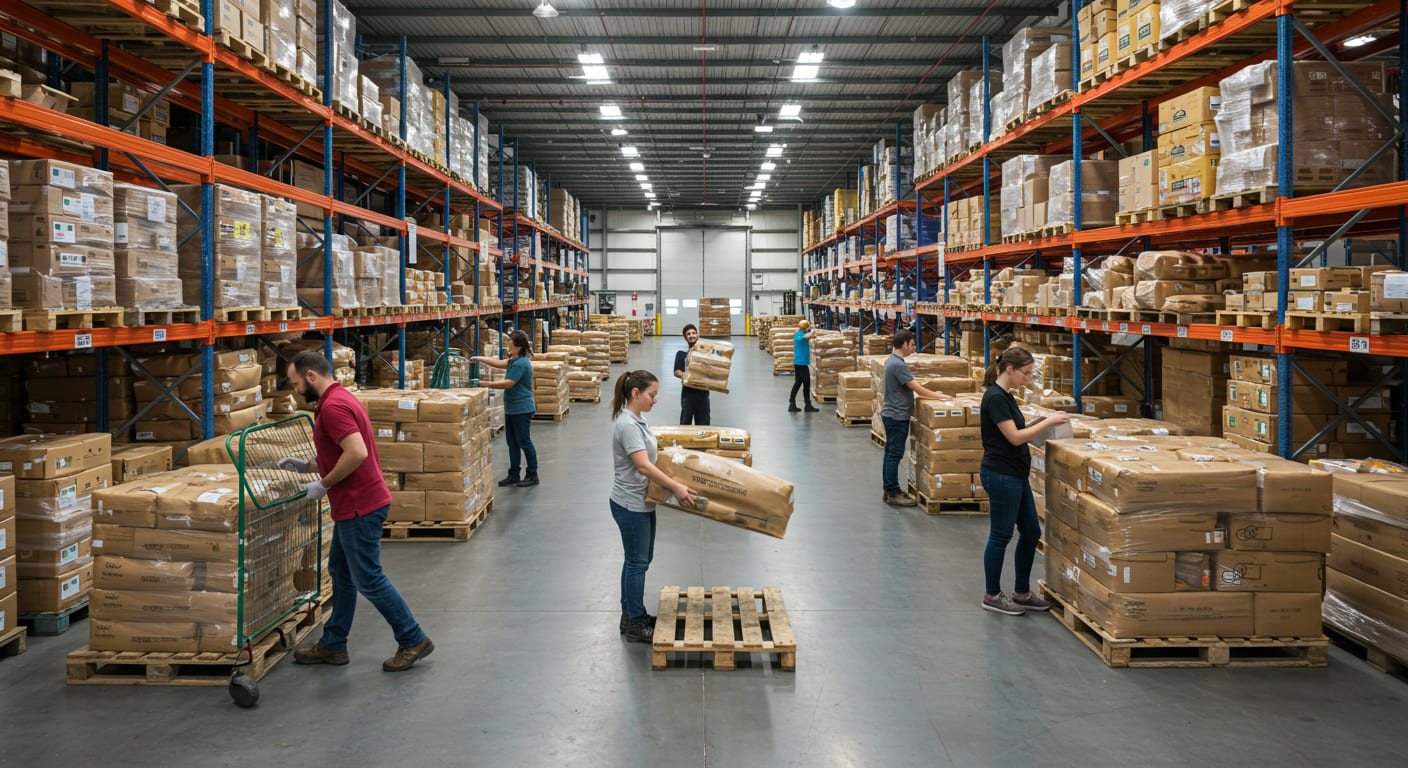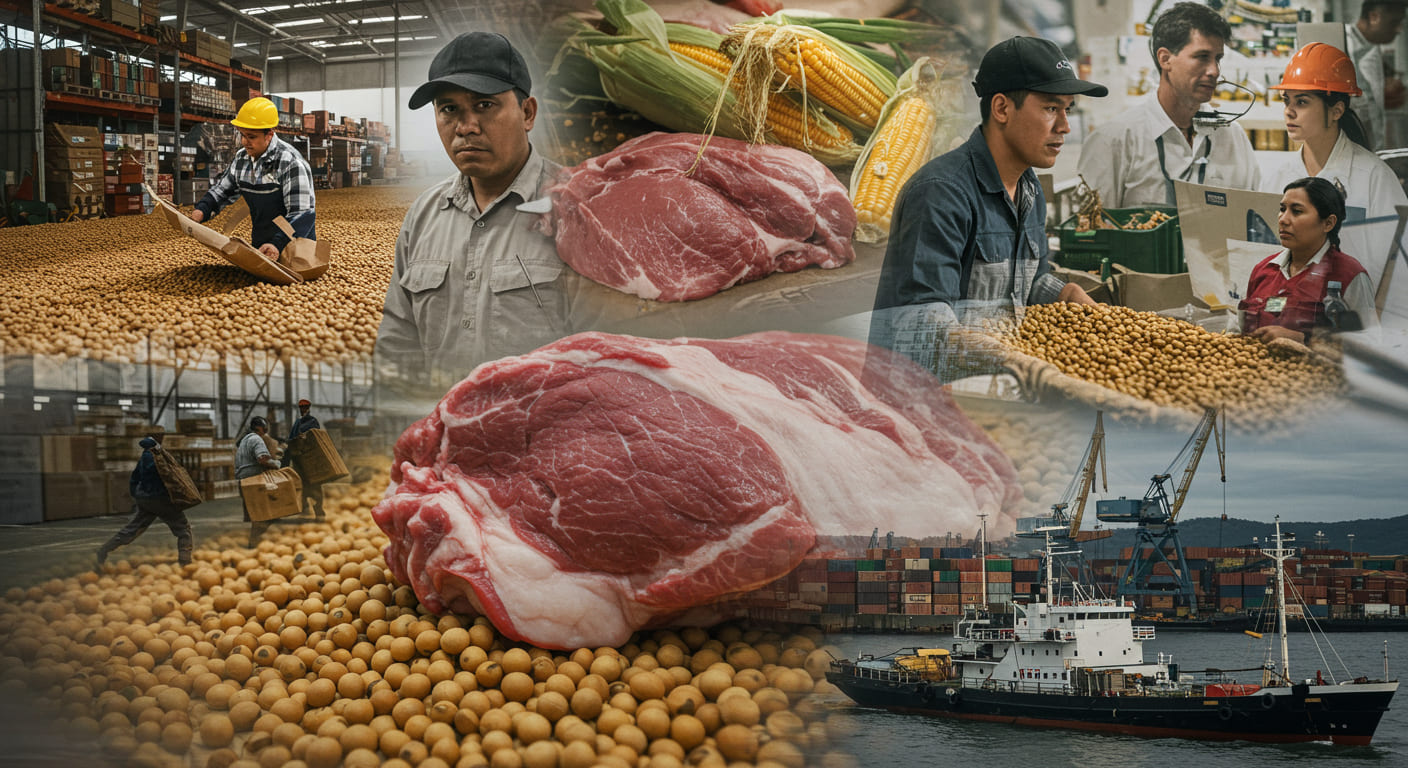Brazil is an agricultural powerhouse and a leading global exporter of soybeans, corn, beef, and cellulose (wood pulp). In 2023, Brazilian agribusiness exports reached a record US$166 billion, nearly half of the country’s total exports. This thriving trade attracts many foreign companies and investors who export these commodities from Brazil. However, doing business in Brazil’s agribusiness sector comes with unique accounting and tax challenges that international exporters must understand. Brazil’s accounting practices, compliance requirements, and complex tax system demand careful attention. In this article, we explain how accounting in Brazil works for soy, corn, meat, and pulp exporters, highlight key compliance considerations, and answer common doubts – with tips on how to navigate regulations efficiently.
International exporters operating in Brazil’s soy, corn, meat, and pulp industries face strict accounting and compliance requirements. Local expertise is crucial to manage bookkeeping, taxes, and reporting in line with Brazilian laws.
Brazilian Accounting and Compliance Basics for Foreign Businesses

Any company operating in Brazil – including foreign-owned subsidiaries or branches – must adhere to Brazil’s bookkeeping and financial reporting laws. In fact, every legal entity with a Brazilian registration (CNPJ) is required by law to keep formal accounting books and prepare annual financial statements, with no general exemptions for foreign firms. This means if you establish a local trading company or subsidiary to export soy, corn, meat, or cellulose, you must maintain proper Brazilian accounts just like a domestic company. Non-compliance can lead to fines or even operational roadblocks, so setting up robust bookkeeping from the start is essential.
Brazilian accounting standards (BR GAAP) are largely aligned with IFRS (International Financial Reporting Standards). Since 2010, Brazil’s norms (Normas Brasileiras de Contabilidade) have converged with IFRS principles. Foreign companies will find many familiar accounting concepts, but must still translate and adjust their financials to meet Brazilian rules and formats. All official financial statements must be prepared in Portuguese and in Brazilian Real (BRL). Even if your head office reports in English and USD, your Brazilian entity’s books need to be in Portuguese/BRL for local authorities. Many foreign entrepreneurs engage bilingual accountants or local firms to bridge this language gap and ensure reports are properly translated.
Another aspect of compliance is Brazil’s advanced digital reporting system. The government uses a platform called SPED (Public System of Digital Bookkeeping) to receive accounting and tax data electronically. Companies must file an electronic General Ledger (ECD) and a digital tax return (ECF) each year through SPED. The ECD (Escrituração Contábil Digital) is an annual upload of your detailed ledger and financial statements, replacing the old paper ledgers. The ECF (Escrituração Contábil Fiscal) is the annual corporate income tax report that uses your accounting data to calculate taxable profit (IRPJ and CSLL). Most companies – especially those not under the very small business regime – are required to submit ECD/ECF files. The deadlines are strict: the ECD for the previous year is due by the end of May, and the ECF by the end of July of the following year. For example, a 2024 ECD must be filed by May 30, 2025 and the ECF by July 31, 2025. Missing these filings or reporting inconsistencies can trigger heavy fines and penalties – often calculated per month of delay or as a percentage of revenues. In extreme cases, late or missing SPED reports can even lead to a company’s tax compliance status being suspended. Clearly, staying on top of digital filings is a must for exporters to avoid disruptions.
Navigating Brazil’s Tax System for Exporters

One of the biggest challenges for foreign businesses in Brazil is understanding the complex tax landscape. Brazil is known for having one of the most complex tax systems in the world, with multiple tax authorities (federal, state, municipal) and dozens of different taxes. Complying with all the tax rules and reporting obligations is notoriously labor-intensive. Brazilian companies spend over 2,000 hours on tax compliance annually on average, far above the global norm. It’s no surprise Brazil ranks near the bottom in ease of paying taxes, which is why expert guidance is invaluable.
For agribusiness exporters, a key point of relief is that export sales are largely tax-exempt. Exports of agricultural products such as soybeans, corn, meat, and pulp are not subject to ICMS (state VAT) or to federal PIS/Pasep and COFINS taxes. This means when you ship goods abroad from Brazil, you do not pay these value-added or sales taxes on the revenue, which is a major incentive for exporters. In addition, Brazil offers special regimes to avoid taxes on inputs for exported goods. For example, under the “Drawback” program, taxes on imported inputs or certain domestic purchases can be suspended or waived if those inputs are used to produce goods for export. Regular exporters should structure operations to maximize these benefits – for instance, by importing necessary materials under Drawback or by claiming tax credits on local input purchases (agribusiness companies can often recover PIS/COFINS credits on inputs like fertilizers, seeds, feed, etc. used in production).
That said, tax-exempt exports still come with compliance work. Exporting companies must file the appropriate tax returns to report their operations, even if the taxes due are zero. Often, exporters accumulate credits for taxes paid on inputs (since their output is untaxed) and need to seek refunds or offset those credits. Brazil’s current system for recovering tax credits on exports can be bureaucratic and slow, requiring meticulous record-keeping. (Notably, a 2023 tax reform was passed that reaffirms exports will remain tax-exempt and promises quicker cash refunds of accumulated tax credits in the future – a welcome change from the past onerous process.) Corporate income taxes also still apply to exporters: companies pay Income Tax (IRPJ) and a Social Contribution on profits (CSLL) on their net income from Brazilian operations. The combined statutory rate is roughly 34% of taxable profits. Accurate accounting is crucial to calculate these correctly in the annual ECF report, taking into account any tax adjustments. Many agribusiness companies choose the Lucro Real taxation regime (actual profit) to fully leverage deductions and credits, though smaller ones might use Lucro Presumido (presumed profit) for simplicity. Each option has pros and cons, and choosing the optimal tax regime is an important decision an accountant can assist with.
Another critical compliance area is invoicing and documentation. Brazil mandates electronic invoicing (Nota Fiscal Eletrônica, NF-e) for virtually all business transactions, including commodity exports. Every time your company exports a shipment of soy, corn, meat, or pulp, you must issue an NF-e in the government system. The e-invoice (in XML format) is transmitted in real time to tax authorities (SEFAZ) for validation. Only once approved can goods be shipped, and a printed DANFe (receipt of the NF-e) must accompany the cargo. This integrated system means every sale is tracked, enhancing transparency but also requiring that your data (product codes, tax codes, etc.) is entered correctly on each invoice. Mistakes in NF-e filings can lead to rejection of the invoice or problems at customs. Maintaining a good accounting system that integrates with Brazil’s e-invoicing platform is highly recommended so that invoices and accounting records stay consistent.
Finally, exporters must remember to handle other operational taxes and obligations. For example, if you operate a local office or warehouse, you’ll have payroll taxes and labor contributions for your Brazilian employees, and you must comply with Brazil’s labor reporting (eSocial) and social security payments. Agribusiness exporters also deal with rural producer transactions. If your company buys commodities from Brazilian farmers, you may be required to withhold a rural social security contribution (Funrural) on those purchases. For instance, when a farming individual sells soybeans or cattle to a company, the buying company is responsible for withholding around 1.5% of the gross sale as Funrural tax, and paying it to the government. This ensures the rural worker’s social security is funded, but it’s an extra step in the accounting process for the exporter. Knowing nuances like this – which products or transactions trigger withholdings, what paperwork is needed for tax-exempt sales, how to document freight and insurance on export invoices – is all part of navigating Brazil’s system.
In short, Brazil’s tax regime for exporters is a double-edged sword: generous export tax exemptions on one hand, and onerous compliance requirements on the other. Companies that succeed are usually those that invest in solid accounting practices and local expertise to manage the workload.
Industry-Specific Insights for Agribusiness Exporters

Exporters of soybeans, corn, meat, and cellulose should be aware of some industry-specific factors in Brazil that can affect accounting and operations:
- Soybeans & Corn (Grains): Brazil’s grain export supply chain often involves multiple players – farmers, cooperatives, traders, exporters. If you purchase grains from local producers, ensure proper invoices (Notas Fiscais) are obtained at each step. Agricultural products have specific tax classifications (NCM codes) and may enjoy special freight tax exemptions or state incentives. Be mindful of inventory accounting as well – harvest seasons can lead to large stockpiles, and you’ll need to track costs for financial and tax purposes. Hedging activities (common in grain trading) should also be recorded correctly under Brazilian accounting rules. An accountant can advise on treating futures contracts or exchange variations, since Brazil has particular rules for tax treatment of foreign exchange gains/losses.
- Meat (Beef & Poultry): Exporting meat entails compliance with Brazil’s agricultural inspection and traceability systems. From an accounting perspective, if you run a processing plant or engage in contract slaughter, you’ll have to account for yield, wastage, and by-products. There are also tax credits for certain feed and vet supplies (under PIS/COFINS rules) that specialized accounting can help recover. When sourcing cattle from ranchers, as noted, your company must withhold Funrural contributions on animal purchases. These contributions, along with any state health inspection fees, should be factored into your cost accounting. Also note that export revenues in foreign currency might need to be translated on your books – the exchange rate fluctuations can significantly impact reported income, and Brazil has rules on when to recognize forex gains.
- Cellulose (Pulp) & Forestry Products: Pulp and paper companies operating in Brazil often benefit from reforestation tax incentives and may deal with long production cycles. Biological assets (tree plantations) are accounted for in a special way (often marked to market under IFRS). Ensure that your accounting policies for forest assets align with Brazilian standards. On the tax side, exports of cellulose are tax-free, but local sales of wood or by-products might incur VAT (ICMS) unless sold out of state or exported. If you import machinery for mills, consider using ex-tarifário or Drawback regimes to cut import taxes. Environmental regulations are also increasingly important – Brazil has introduced guidance (e.g. OCPC 10 on carbon credits) to account for sustainability measures. If your firm generates carbon credits through forestry projects, you should follow the new standards for recognizing those in the balance sheet. While this is a niche area, it’s a curiosity that Brazil is on the forefront of linking accounting with sustainability initiatives.
Across all these sectors, one common thread is the need for accurate documentation. Brazilian authorities may audit export transactions to ensure no diversion to the domestic market without taxes. Maintaining clear records of export bills of lading, customs declarations, and proof of foreign payment is critical, as your accountant will use these to substantiate the zero-tax treatment of sales. Likewise, careful tracking of input taxes and credits will allow you to reclaim what you’re owed. Many companies struggle with the “paperwork load” in Brazil’s agribusiness, but those who keep organized records (often with the help of modern ERP software and skilled bookkeepers) will fare much better.
Leveraging a Specialized Accounting Partner in Brazil

Given the complexity of Brazilian accounting and tax compliance, working with a specialized local accounting firm is highly advisable for foreign exporters. Experts on the ground can save you time, money, and headaches by handling the intricate filings and keeping you up-to-date with changing rules. For instance, Brazilian tax laws and e-invoicing layouts are evolving with the new tax reform, and having someone monitoring new regulations (e.g. updates to SPED or NF-e requirements) ensures you remain compliant.
CLM Controller is one such firm that focuses on helping international companies in Brazil. With over 40 years of experience, CLM Controller specializes in Brazilian accounting and tax support for foreign entrepreneurs and multinationals. One key advantage of partnering with a firm like CLM is the blend of local expertise and international perspective they provide. The CLM team is accustomed to reporting to foreign headquarters in English while keeping official books in Portuguese, effectively bridging the gap for overseas clients. They handle everything from setting up your chart of accounts in compliance with Brazilian GAAP, to managing all tax filings (SPED ECD/ECF, VAT, payroll taxes, etc.) and advising on the best tax regime for your operation. CLM can also assist with payroll, invoicing systems, and real-time guidance so that your Brazilian subsidiary’s finances remain healthy and transparent.
At CLM Controller, we pride ourselves on being specialists in servicing agribusiness exporters. Our professionals have deep knowledge of the soy, grain, meat, and pulp sectors, and understand the specific incentives and obligations that come with each. Whether it’s navigating tax exemptions on exports, handling Funrural withholdings, or preparing bilingual financial reports for your consolidation, we’ve got you covered. Don’t let Brazil’s accounting rules intimidate you – with the right partner, you can focus on growing your export business while we take care of the compliance.
Conclusion: Succeeding in Brazil’s Agribusiness Market

Brazil offers enormous opportunities for exporters in soy, corn, meat, and cellulose. The market is vast and the growth potential is high, especially as Brazil continues to expand its agricultural output sustainably. To seize these opportunities, foreign companies must adapt to Brazil’s accounting and tax environment. By understanding the basics of Brazilian GAAP, fulfilling bookkeeping duties, and leveraging all available tax benefits, exporters can thrive in Brazil’s competitive landscape. Equally important is staying compliant – the cost of non-compliance in Brazil is simply too great, given the fines and risks of business disruptions.
In summary, success in Brazil’s agribusiness export sector comes down to preparation and the right support. Do your homework on local requirements, invest in professional accounting help, and structure your operations to take advantage of Brazil’s export incentives. With meticulous accounting, proactive tax planning, and a trusted partner like CLM Controller by your side, your company can confidently navigate Brazilian accounting and focus on what it does best – exporting high-quality soy, corn, meat, and pulp to the world. Brazil’s market rewards those who pair entrepreneurial drive with solid compliance, and with the guidance outlined above, you’ll be well on your way to achieving both.





0 Comments